In early June 1968, Ken Cooper arranged for the group to work at the upmarket Prince Alfred club in Sydney for six weeks, while Prince Alfred resident band Frankie Stevens & The Castaways worked the Wellington scene for Ken.
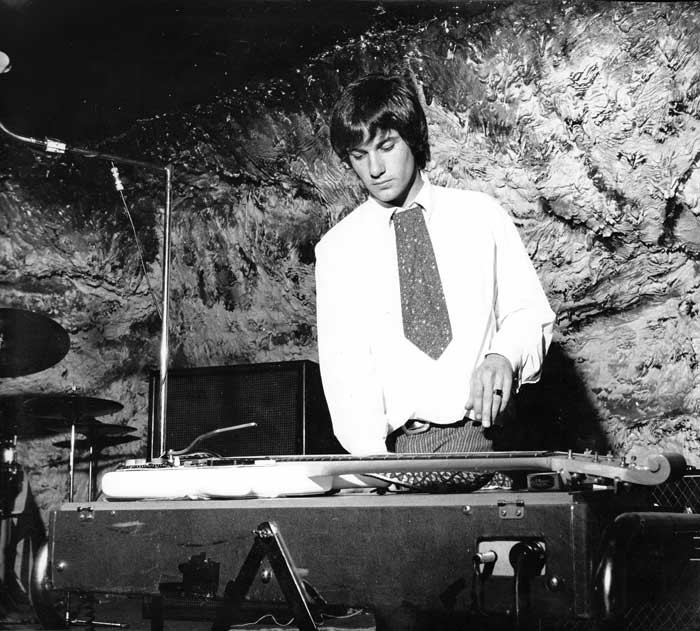
Clive Cockburn at Ali Baba's, 1968 - Photo by Sal Criscillo
Produced by Nick Karavias and engineered by Frank Douglas at HMV's Wellington studios, The Avengers’ debut album, Electric Recording, was released on 28 May 1968, just prior to their departure to Sydney, amidst a barrage of publicity from Ken Cooper. The press kit featured a dozen separate items including an assortment of different brochures, stickers, photos and folders which all started arriving in intervals at the various media offices, beginning two weeks before release. Several music writers and reviewers acknowledged the professionalism of the campaign and the quality of the press kit, a media blitz that was rarely, if ever, afforded to a local release.
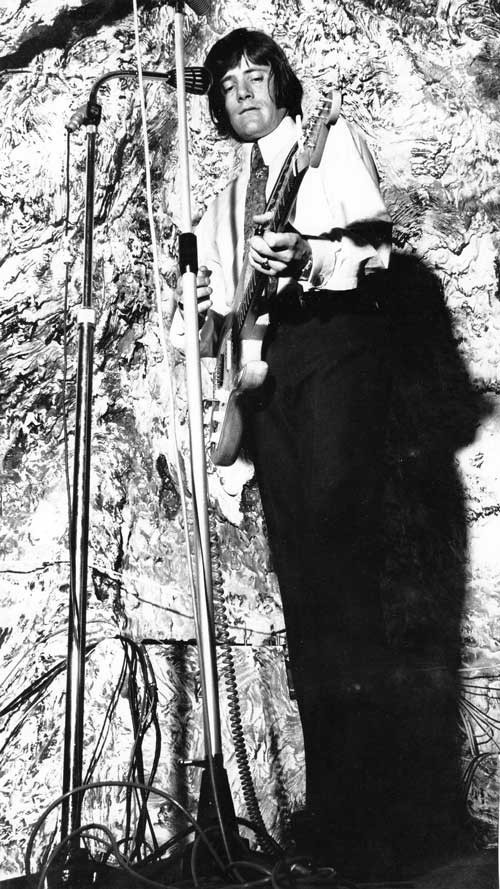
Dave Brown at Ali Baba's, 1968 - Photo by Sal Criscillo
Advance orders prior to the release of the album sold out the first pressing, necessitating a swift re-pressing, which was delivered to stores four days after the initial release. There were reports of queues outside record shops for the new stock. New Zealand didn't have album charts in those days, but it’s fair to assume that The Avengers’ Electric Recording wouldn't have been far from the top spot if such a chart had existed at the time.
The album reviews almost universally hailed it as a milestone recording – bar one anonymous reviewer who claimed that it was, “under produced and out of tune”. Apart from that arguably misguided opinion, the only negative comments were that out of the 12 tracks included, six had already been released as singles (both sides of their first three singles).
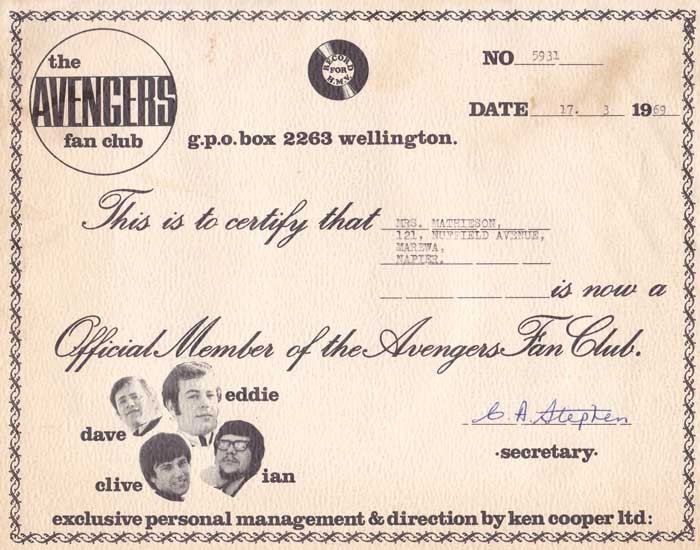
Chris Malcolm wrote six of the 12 tracks and they remain the highlights along with two tracks written by Clive Cockburn, one of which was a co-write with Chris. One of Chris Malcolm’s songs was ‘Water Pipe’. Chris is noncommittal about the song’s subject, which cleverly disguises a drug high. The group had a simpler recollection of the song, as Clive Cockburn reveals, “We were all pretty naive about the subject matter and as a group we were rather reserved, we knew ‘Water Pipe’ was about drugs but we didn't put much thought into it, we rarely drank beer let alone do drugs.”
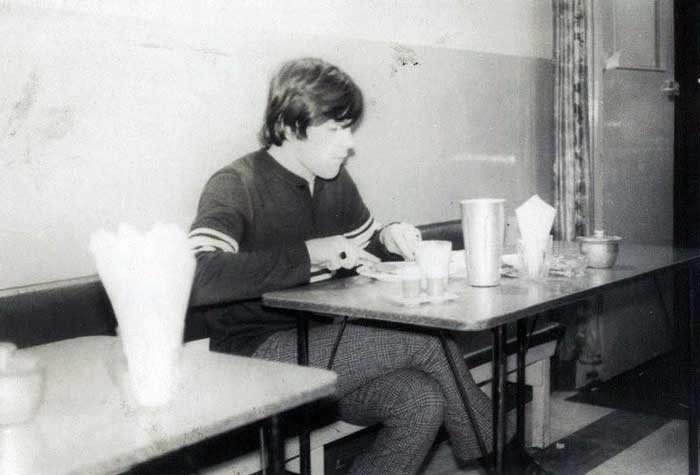
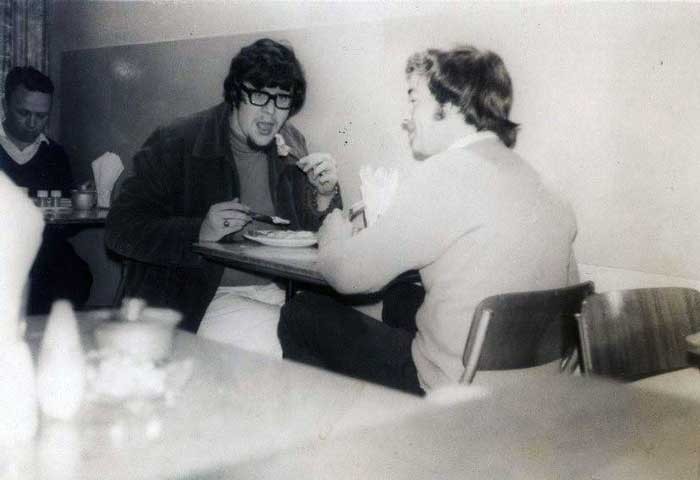
Life on the road ...
The first week in Sydney was a media blitz with magazine and radio interviews, plus a grand tour of the Sydney Studios of EMI/ Columbia where they were invited to sit in on a Mike Perjanik recording session for Australian pop singer Little Pattie. On their second week, they appeared on the television show Uptight and the popular dating show Blind Date. To coincide with their visit, ‘Only Once In My Life' was released in Australia.
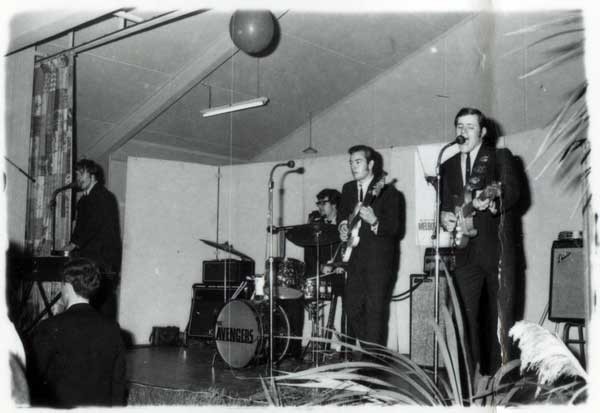
The Avengers in Masterton, likely 1967 - Photo by Ken Alexander
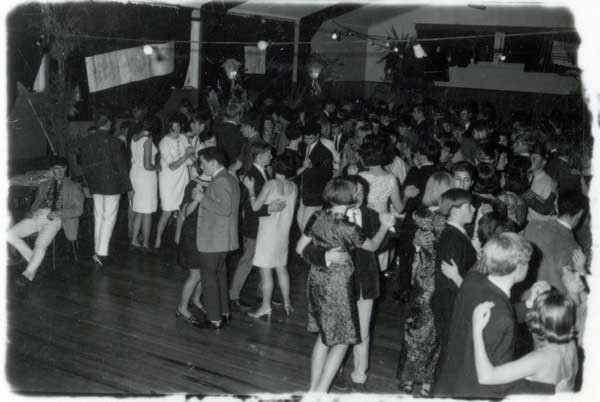
The crowd in Masterton - Photo by Ken Alexander
Meanwhile, back home Keith Richardson was keeping the local fans up to date with a steady stream of taped reports from the guys which revealed they were enjoying their time in Sydney and even had enough free time to practise for three hours a day after working from 7pm until 1am.
During their period in Sydney, the group played alongside such Australian bands including Doug Parkinson In Focus, Billy Thorpe, The Groop, The Mixtures and Bon Scott's group The Valentines. They spent their nights off checking out other local clubs and groups, baulking at admission prices of up to $2 in some clubs compared to the average 50c admission fee back home. They were impressed with The Groove, which included New Zealanders Peter Williams and Rod Stone in their line-up. They also managed to check out the plethora of other New Zealand groups on the scene such as Max Merritt & The Meteors, The Cleves, Larry’s Rebels and Compulsion.
Frankie Stevens: “When we got back to the Prince Alfred we heard nothing but glowing reports from patrons and fans alike about The Avengers, they really left their mark in Sydney.”
Barely off the plane from Sydney, The Avengers were rushed into the studio to record their fourth single, ‘Love-Hate-Revenge’ which, once completed, was rush released on 15 July 1968 with Alan Galbraith’s baroque ballad ‘Only Last Year’ on the B-side.
“I wrote it in Auckland after the demise of my group The Real Thing. I was being encouraged by Avengers producer Nick Karavias to write more for other artists, especially the Avengers. I was keen to start a new life as a singer songwriter, but this song was not really what I wanted to do myself so I offered it to them.”
‘Love-Hate-Revenge’ started life as an obscure single for US singer Dion’s vocal backing group The Del Satins in January 1967. A month later UK band The Episode Six recorded and released their version and it is this version that The Avengers followed, although with its four-part harmony it coincidentally follows The Del Satins original – though the group were unaware of it.
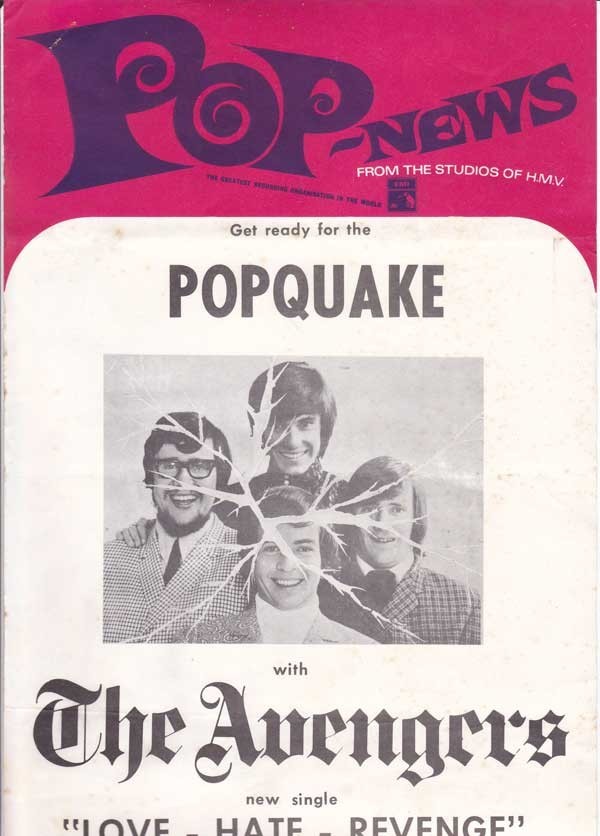
An HMV promo sheet for Love-Hate-Revenge
Clive Cockburn: “We were so happy listening to the playback for ‘Love-Hate-Revenge’, as a group we knew that we had the Loxene Golden Disc award virtually in the bag after losing narrowly to Mr. Lee Grant during the previous year. Two weeks later Allison Durbin’s ‘I Have Loved Me A Man’ was released and our hearts sank, we knew straight away that she was the winner.”
As Clive and the group predicted, Allison Durbin went on to win the Loxene Golden Disc Award and once again The Avengers were a close second. ‘Love-Hate-Revenge’ remains one of the group’s most enduring records and their biggest hit, peaking at No.2 on the national Top 20 during August/ September 1968 and remaining on the chart for 13 weeks.
Because of their versatility and ability to sing four-part harmony, Nick Karavias arranged for The Avengers to be one of three resident acts on a new television programme, Studio One. Studio One was both a national talent quest and also a songwriting competition. Karavias's growing reputation saw him picked as one of the judges – and with 1,800 songs submitted from the country’s budding songwriters he would have seen this as an excellent opportunity to source new material for The Avengers. The Avengers’ role on the show was to interpret and perform some of the selected new compositions.
The weekly regime of rehearsals and recording for a weekly television programme gave the group a brief respite from touring too far afield for a few months. They did manage a quick trip to Auckland in late July, for gigs at Phil Warren’s clubs the Monaco, Mojo’s and the Oriental Ballroom, with an appearance on C’mon 68, where they sang ‘Love Hate Revenge’ and The Los Bravos song, ‘Bring A Little Lovin’.
During the last half of 1968, it was decided that The Avengers would return to Australia early in the new year for an unspecified period in a bid to establish their name there and build on the goodwill and contacts from their previous expedition.
In the interim, two new albums were planned, for release during their absence. First up was a live album to be recorded at popular Wellington nightclub Ali Baba’s. In preparation for the live album, Nick joined the group on a short tour of the South Island to assess which songs appealed most to the fans. The tracks for the live album were recorded during an eight-hour session on 19 November in front of a mostly invited audience of fans and visiting American GIs. HMV’s latest signing, Tom Thumb warmed up the crowd with a blistering set of rock and blues, although unfortunately the Tom Thumb set doesn’t seem to have been recorded.
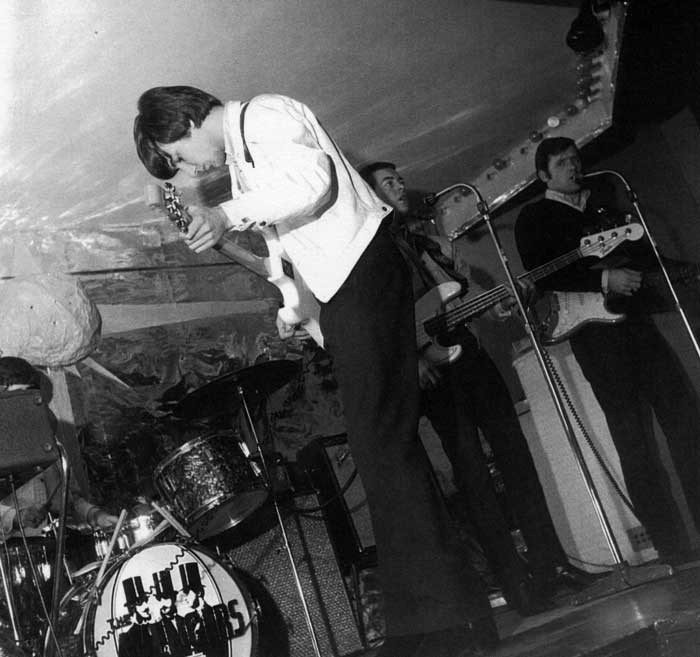
The Avengers at Ali Baba's, 1968 - Photo by Sal Criscillo
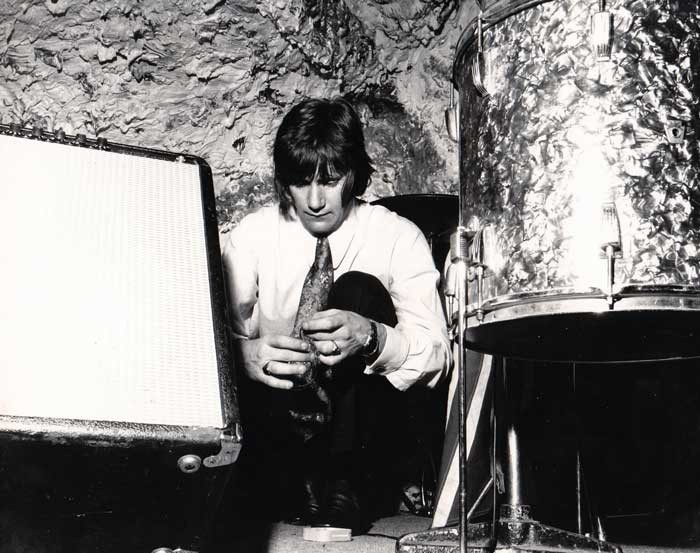
Dave Brown in his element, Ali Baba's, 1968 - Photo by Sal Criscillo
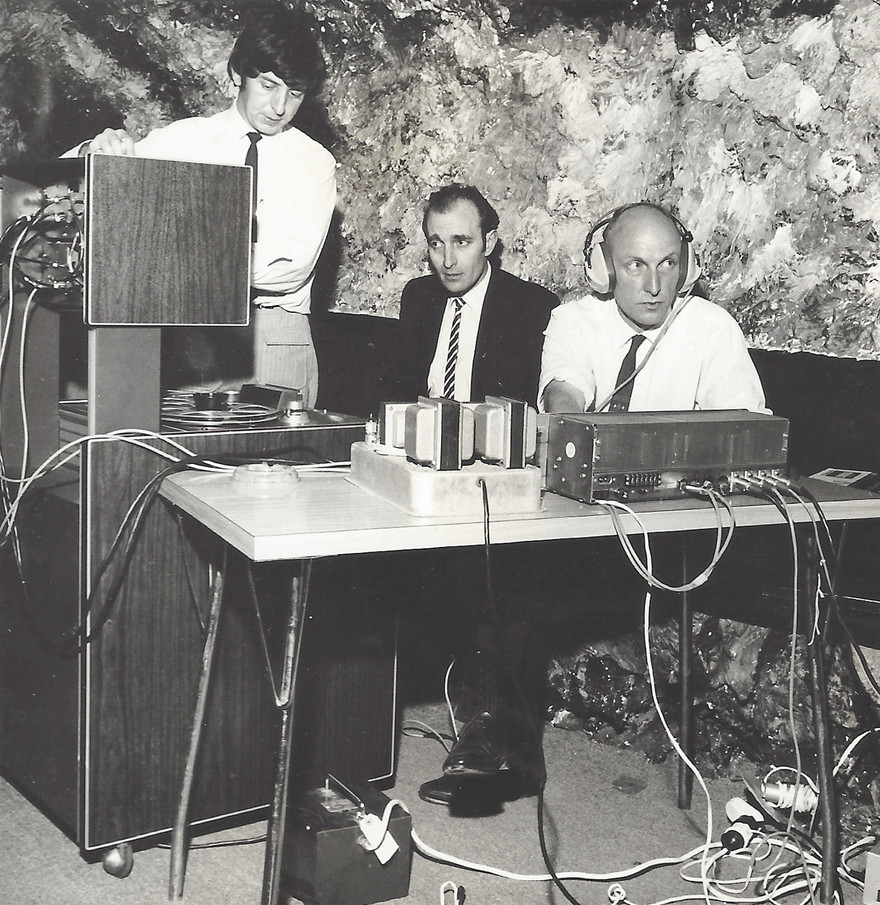
For The Avengers’ third album it was decided to capture the band in the heat and excitement of a live performance. The venue was Wellington “discotheque” Ali Baba’s on Cuba St, nowadays the popular San Fran. Back then the club’s decor replicated in papier mache the interior of a mineral-encrusted cave. Frank Douglas (right, with headphones) installed the HMV equipment among the stalactites. Producer Nick Karavias sits beside him. For the resulting album, the group’s hits were relegated to a brief medley at the end of side two, while the set was dominated by current rock and soul covers – ‘Hey Jude’, ‘River Deep, Mountain High’, ‘Hold On I’m Coming’ among them. Alive! Avengers In Action was recorded on 19 November 1968. - Photo by Sal Criscillo.
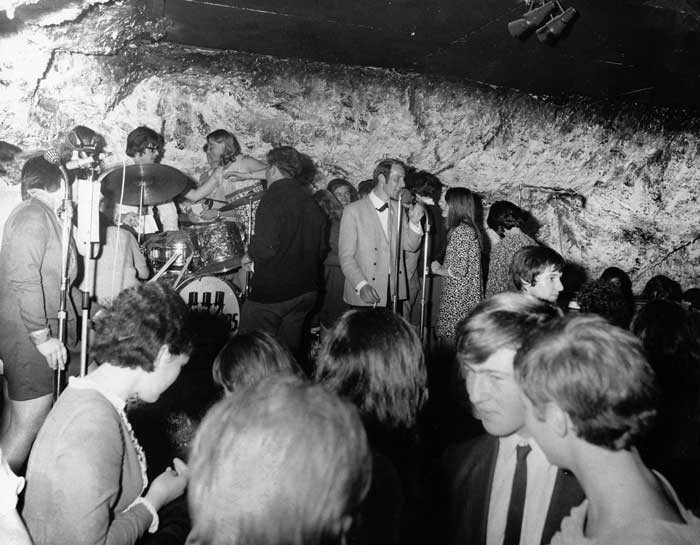
The Avengers at Ali Baba's at the end the of the live recording of their album Alive! Avengers In Action, November 19, 1968. MC Keith Richardson is at the mic. - Photo by Sal Criscillo
During November, December and January, the group also finished tracks for their upcoming studio album and recorded a Christmas fan club record. The group’s fifth single, ‘The Days Of Pearly Spencer’ was released on 4 November 1968 and peaked at No.4 on the national Top 20 during January 1969, staying in the chart for seven weeks.
‘The Days Of Pearly Spencer’ was an excellent choice by Nick Karavias as a single. The original version, by Irish folk singer and songwriter David McWilliams, should have been a big hit in the UK where it was released during October 1967. A massive ad campaign for the record saw full page and cover page ads adorn all of the major UK music papers but for some reason the inferior ‘Harlem Lady’ was pushed as the play side. ‘Harlem Lady’ eventually lurched into the UK Top 50 for a few weeks before vanishing ‘The Days Of Pearly Spencer’ became a top 10 hit in West Germany.
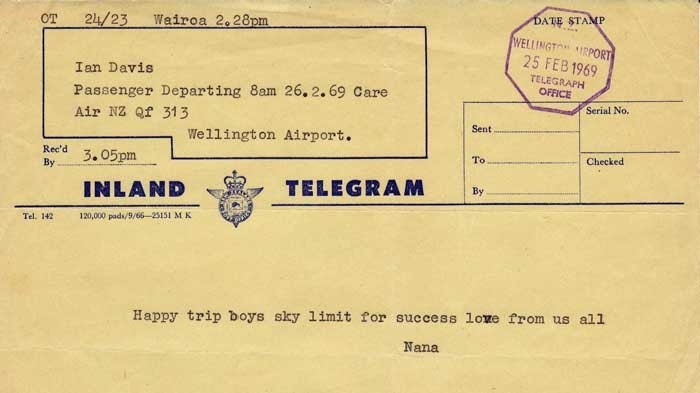
The telegram sent to the band from Hank Davis' Nana as the band departed to Australia, February 1969
Nick Karavias’ decision that The Avengers record a more commercial version was a good call as the song was begging to become a hit. The other side of the 45 was a new song from Clive.
“I wrote ‘Daniel The Postman’ after returning to the family home at Days Beach after being away. It was the day after the Wahine disaster and I arrived home to find a bulldozer on the lawn pushing back debris. The house had been severely damaged with shellfish on the floor and small crabs scurrying across the floor, wondering what the hell had happened. Most of the furnishings had been removed except for an old set of drawers and our piano. I sat down at the piano in despair; I was watching a mouse in the drawers trying to get out and I started writing ‘Daniel The Postman’ mainly to put something amusing back into a depressing situation. I wrote the song as a play on words – the words were mostly nonsensical but a few real people and made up people get name checked. ‘Daniel The Postman’ is actually Daniel Boone, ‘Daniel the Postman is a Boone to the nation of idiots’.”
The Avengers left New Zealand for Melbourne on 26 February 1969, leaving behind two complete albums of material (including the live album) and a new single, ‘Night In The City’ b/w ‘Nights In White Satin’ which was released a few weeks after the group’s departure. ‘Night In The City’ is a Joni Mitchell song from her 1968 debut album Song To A Seagull. The Avengers’ version, despite being well received by the critics, fell on deaf ears as far as the record buying public were concerned and it quickly disappeared that autumn, becoming an unaccustomed flop. It was the wrong song for the group, not helped by a rather maudlin introduction and first verse, which took just over a minute to get to the climatic and swirling chorus, courtesy of Dave Brown’s new self-built Leslie cabinet.
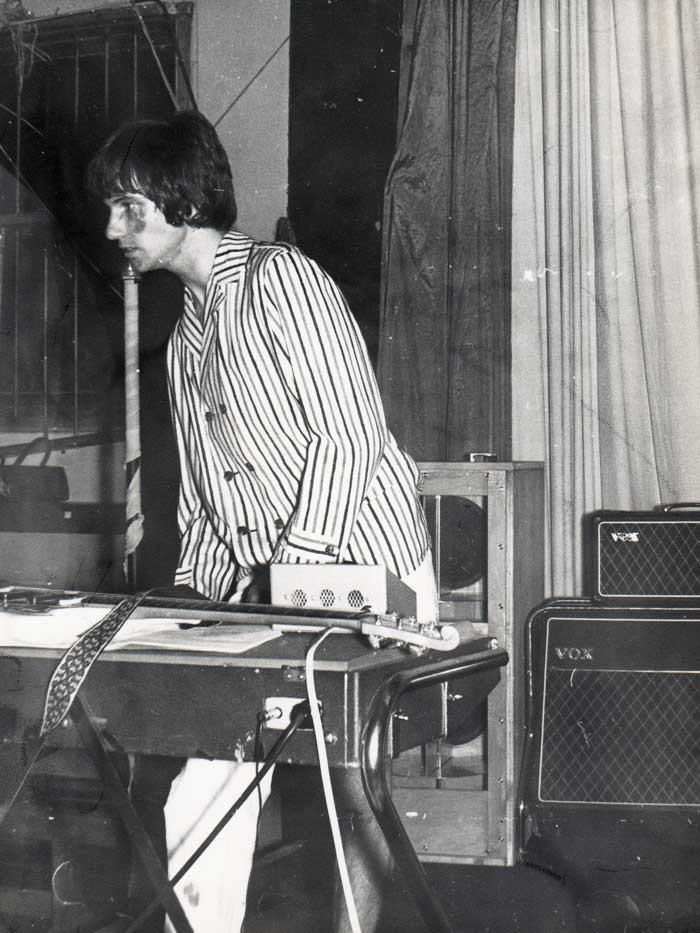
Clive Cockburn. Behind Clive is the homemade Leslie cabinet built by Dave Brown. - Hank Davis collection
In Australia they were handled by husband and wife team Lin and Lyn Annabel, who had just returned to their homeland after spending most of the 60s in Auckland, where they operated a photography business just above the Galaxie nightclub. Lin was also a writer, with work in several periodicals and newspapers on the local entertainment scene, plus a book on Australian pop, and he did promotional work.
Lin was an excellent publicist and, taking a leaf out of Ken Cooper’s book, flooded the local media with a barrage of Avenger promotional items, which made an impression with the local press. Expectations were high. Lin had the group booked solidly for three months with the first two weeks comprising assorted promotion work, meeting the local media, high profile gigs, television and radio work. This exciting start was somewhat dampened by the fact that money was going to be tight and the group would have to live in the couple’s house with their two young children. The lounge was transformed into a dormitory for Eddie, Clive, Hank and Dave.
Their domestic situation aside, everything went well and The Avengers hit the ground running in a sea of publicity despite the fact that they had never been to Melbourne before.
Their first public duty (well reported in the press and television) was a meeting with the Lord Mayor of Melbourne, Councillor Porter and Victorian Premier Sir Henry Bolte to present them with a goodwill document from the people of Wellington, via Wellington Mayor, Sir Francis Kitts. After the official formalities were concluded it was back to rock and roll for the group with a television appearance on Uptight and several prominent discotheques and club gigs to finish their first week.
The Avengers finished their first week with two very influential fans: local 3UZ disc jockey Stan Rofe (the first Australian DJ to play rock and roll) and Brian Cadd. Even though ‘The Days Of Pearly Spencer’ had not been released in Australia Stan was already spinning it on his show and predicted big things: “I feel that The Avengers will fill the gap left by the recent break up of The Twilights.”
Brian Cadd (then with The Groop) predicted, “The Australian public is demanding a change and this must come. I think that The Avengers from New Zealand will be this change, their musical ability is exceptional.” High praise indeed when you consider the competition.
For some reason ‘The Days Of Pearly Spencer’ wasn’t released straight away in Australia and Decca’s Australian licensee (EMI, who also had The Avengers) released David McWilliams’ original version a full 18 months after its UK release, which trumped The Avengers’ impending version and led Columbia (another division of EMI) to quickly swap sides and make ‘Daniel The Postman’ the A-side. The Syd Barrett-esque ‘Daniel The Postman’ was a perfect B-side to any record and highlighted Clive’s burgeoning songwriting ability, but with its almost demonic voiced chorus, it was never going to be a commercial chart record. A film clip of ‘Daniel …’ was produced and screened in Australia once before fading into obscurity. With a jump-start, McWilliams’ version of ‘The Days Of Pearly Spencer’ became a reasonably sized hit in parts of Australia including No.10 in Brisbane, No.27 in Perth and No.20 in Melbourne, despite Stan Rofe’s efforts.
The group then learned that there was an Australian group also called The Avengers, hailing from Brisbane. The New Zealand and Brisbane namesakes met during the first few weeks in Melbourne when both groups were invited to appear on the television pop show Uptight. In a fan club newsletter, Hank described the meeting for their fans: “Last Saturday we appeared on the pop show Uptight for the second time. Also on the show were The Avengers from Brisbane and, apart from both of us performing our own songs, we split up and divided into two teams for a competition called pick a hit. Although we only saw the Brisbane boys for about two hours we found them to be great guys and very easy to get along with.”
With both groups on the Columbia label in Australia, it was agreed that each group would refer to themselves as either The Brisbane Avengers and The New Zealand Avengers. Straight away the comparisons started when the two Avengers discs were released in the same week with all reviews hedging their bets on the NZ Avengers disc. On the live scene, comparisons were made in several newspapers with the general consensus being that the Brisbane group were far more lively on stage while the New Zealand group looked and dressed better and possessed exceptional harmonies. On the downside it was noted that The NZ Avengers set list was made up of covers, the review went on to say “they will need to change this as it may be okay in New Zealand but it is not good enough in Australia”. Cutting words but very true as the group were known for not performing their own tracks live and it was noticeable that they almost begrudgingly sang a medley of three of their hits on the just released live album (in New Zealand) Dial AAA-Alive ! Avengers In Action.
During their third week in Melbourne, they were flattered when asked to appear on the first episode for a new and much-anticipated television pop show, Turning On. Ron Blackmore, the show’s producer, who had arranged a plum support for Larry’s Rebels on the Easybeats homecoming tour the previous year, took note of the wave of excitement around The Avengers and had no hesitation in booking them for the first show. The Avengers sang ‘Daniel The Postman’, and cover versions of ‘Fox On The Run’ and ‘The Grooviest Girl In The World’.
Using Melbourne as a springboard, the group spent much of April and May continent hopping between Sydney, Adelaide and Perth. Their records had previously been popular in Adelaide where they had a good sized fan base and once again they repeated their ambassadorial duties as in Melbourne and presented a document to the Mayor of Adelaide on behalf of the Mayor and people of Wellington, which was televised during the evening news. Perth was also good for The Avengers who felt at home there. Hank: “We felt comfortable in Perth, it was just like 1950s New Zealand at the time.”
The group recorded their next single between the 18 and 20 May at Columbia Records’ studio in Melbourne. Both sides of the record were Clive Cockburn originals, ‘Love Is A One Way Ticket’ b/w ‘I Wouldn’t Do That’, both produced by Howard Gable. The group had high expectations for the success of the record and letters home from the time showed the group in a buoyant mood with talk of a visit home late in the year, while talks were underway for an extended six-month visit to the USA early in 1970.
However, just over four weeks later the group would be no more. Their career up to this point had been a perfect aligning of the planets with the right people orbiting into their lives and contributing at various times while the group helped themselves by staying true to their values and avoiding the controversies and temptations that the music business can trap you into.
Four days after their recording session Dave Brown was admitted to hospital for an emergency hernia operation. Today hernia operations are done as day surgery with one to two weeks of recovery at home. In 1969, a hernia operation required eight weeks in hospital. This was devastating news for the group who had bookings right through to late August. Their first reaction was to cancel all bookings because of the impossibility of finding a lead guitarist who could handle lead vocals in such a short amount of time.
Melbourne disc jockey Stan Rofe recommended John Pugh, who was between groups at the time. Pugh was an experienced vocalist and guitarist and had been a member of several high profile Australian bands including The James Taylor Move and The 18th Century Qt. On the surface John seemed the perfect temporary replacement, but all was not as it seemed and the group were warned against using Pugh who, it was alleged, had a history of causing bands to break up. Clive, Hank and Eddie noted the information but questioned that how much harm one person could do to an established group in such a short time. After five days rehearsing with Pugh the group resumed their heavy workload.
There were some memorable gigs from this period including a lunchtime gig at Melbourne's Watsonia High School where fans rushed the stage, damaged gear and tore at the groups clothing and hair. The guys managed a hasty retreat to the graffiti covered van while the teachers brought things under control.
True to form John Pugh soon started to disrupt the fine-tuned internal workings of the band, which the remaining trio worked to control, as Dave Brown was only three weeks away from full recuperation.
Dave Brown meanwhile had been lying in his hospital bed reevaluating his life and he made a decision to leave the band and return to his first love of working with wood as a cabinetmaker.
Hearing Dave’s decision the group imploded immediately: the thought of either working with John Pugh – or getting rid of him – seemed unpalatable. Other matters surfaced – money or rather lack of it was becoming a bigger issue; the group had an accommodation problem; Clive Cockburn’s frustration at not having enough quality time to write songs had been a concern for some time; while Hank Davis and Eddie McDonald were keen to explore a more progressive free flow, jazzier style of music, a genre that wouldn’t include Clive who detested anything with 10 minute guitar or drum solos.
The group made a swift decision to call it a day there and then – the usually reliable Avengers had neither the mental or physical strength to pick themselves up from the floor and board the plane in an hour’s time for bookings at Caesars in Sydney.
On the following day, 30 June 1969, Ken Cooper released a press statement stating that The Avengers would be going their own ways from the above date, listing dissension and a desire to play other forms of music as reasons for the breakup.
Two days later Lin Annabel, who had obviously been in damage control in trying to keep the group together, released a follow-up statement that all was not lost, with Clive Cockburn and Hank Davis looking to reform the band with two new members.
However, Lin followed up a few days later with confirmation that The Avengers would not reform.
The last single, ‘Love Is A One Way Ticket’ b/w ‘I Wouldn't Do That' was released in Australia on 10 July. While in New Zealand ‘Out Of Sight, Out Of Mind’ was released as a single with their version of the early 60s Bert Berns track ‘You Better Come Home’ as the B-side. ‘Out Of Sight, Out Of Mind’ was written by Dave Jordan, and was recorded during the previous year when it was a finalist in the Studio One songwriting contest. The track was arranged by Don Charles, who also played piano on the recording, with Clive Cockburn playing organ.
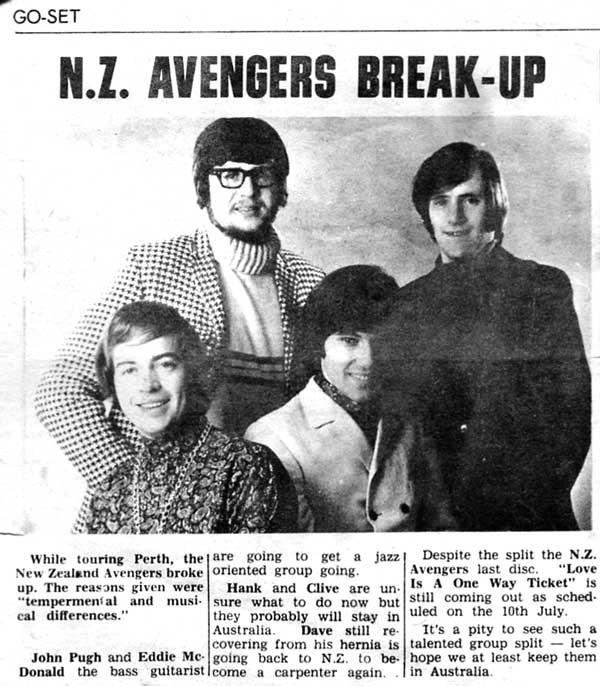
The Avengers breakup as seen in Australian Go-Set magazine
With no band to promote both releases, they quickly faded away, while fan clubs in both counties had already wound themselves up.
A dejected and tired Cockburn returned home first and told the press that he would never join or be part of a band ever again. A penniless Dave Brown returned back home unnoticed a short time later, while Hank Davis and Eddie McDonald, with a spring in their step, set about forming a new band to play jazz-rock. It would eventually become Bakery – the group name derived from the word dough, as in money.
Before The Avengers left for Australia and before they broke up, the plan was to release their third album Medallion in August, when the group proposed to return home for a short spell. In the end it was released posthumously in September 1969 with little fanfare, along with the locally pressed Australian recorded single ‘Love Is A One Way Ticket’ b/w ‘I Wouldn't Do That’.
There was one final act to be played out for The Avengers. ‘Out Of Sight, Out Of Mind’ had not only made the finals of the Loxene Gold Disc Award, but the song had also won the APRA Silver Scroll songwriting award for Dave Jordan. Clive Cockburn agreed to lip-synch the song on the televised Loxene Award show in November 1969, where host Peter Sinclair introduced him as The Lone Avenger.
It would have been a poignant three minutes and 33 seconds for Clive Cockburn as he sat at the grand piano, lip-synching to his vocal and hearing his musical family of the last three years coming to life through the foldback speakers. As the panel operator faded the image on the last note and the studio lights were dimmed to the sound of canned applause, so came down the final curtain on The Avengers.
--
Read The Avengers story part 1 here